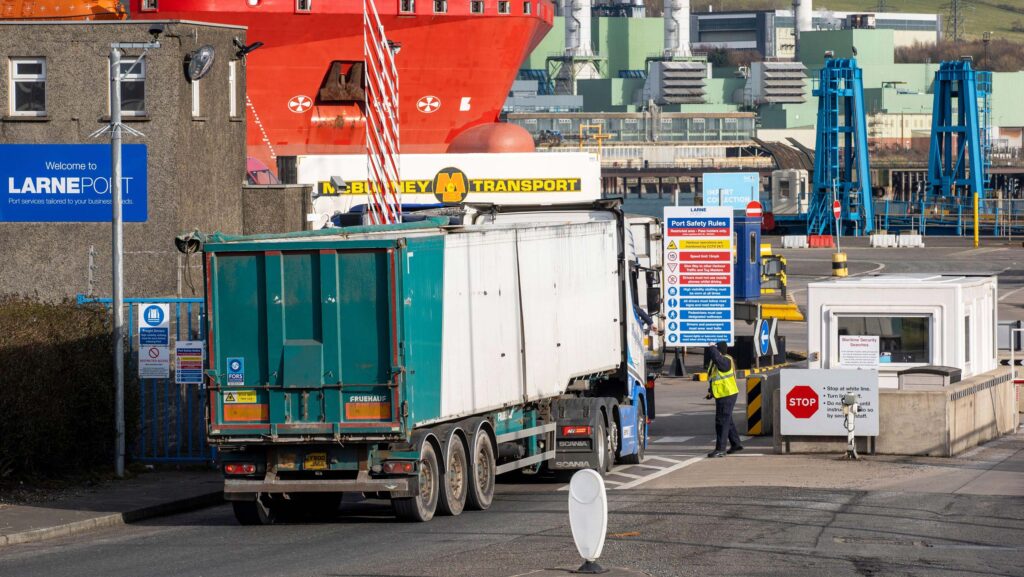Industry alarm over failures to detect smuggled meat
 Larne port © PA Images/Alamy Stock Photo
Larne port © PA Images/Alamy Stock Photo Port authorities in Northern Ireland have seized roughly 600kg of illegal meat, smuggled in on the Stranraer to Larne ferry, raising concerns at the ease at which it evaded detection.
The vehicle had entered the UK at either Dover or one of the other ports in eastern England, and travelled through the country unchecked, potentially exuding dangerous viruses from its loose packaging.
See also: Concerns raised over Defra’s response to FMD threat
Shocked port officials discovered the consignment before it entered the island of Ireland where is could have caused catastrophic outcomes for the essential farming industry, both north and south of the border.
The grim discovery came amid mounting concerns over how mainland Britain’s border is being policed while under the constant threat of animal disease, in particular African swine fever and foot-and-mouth (FMD) disease.
Roundtable
The illegal meat find was discussed at a roundtable meeting of Department of Agriculture, Environment and Rural Affairs (Daera) officials and industry stakeholders, including representatives from the Ulster Farmers’ Union, on Friday 17 January.
An industry source, who attended the meeting, said: “The discovery begs the question what the port authorities in Northern Ireland are doing that those at ports in Britain are not.
“Having entered the UK, the consignment exited Britain at the Scottish port of Stranraer, before it was eventually intercepted at a third checkpoint in Larne, Northern Ireland.
“Every port’s health officer has a duty to have an enquiring mind when a vehicle appears to be suspicious. It would be fascinating to find out what made the officers at Larne stop the vehicle after two other UK ports had allowed it through.”
Funding issues
At a recent Environment Food and Rural Affairs (Efra) committee meeting in Westminster, MPs heard that Dover Port is starved of money and resources to adequately protect the border from biosecurity risks.
Lucy Manzano, head of the Dover Port Health Authority, told the hearing she had asked Defra repeatedly to provide more funding and resources at Dover Port and the Sevington Border Control Post, 22 miles inland, in order to clamp down on suspicious vehicles.
Food health experts also told the Efra hearing that the amount of illegal meat being intercepted at UK ports was likely to be “just the tip of the iceberg”.
The industry source added: “All sides are becoming exorcised about successive governments’ lack of interest in securing our borders from the increasing threat of exotic diseases.
“Isn’t it time that the UK considered illegal meat imports to be as much of a threat to the economy as that posed by drugs and firearms?”
The 2001 FMD outbreak is estimated to have cost the UK economy £8bn which, allowing for inflation, would be around £17bn today – £3bn short of the £20bn fiscal “black hole” the Labour government claims to have inherited when entering office.
Government responses
A Daera spokesperson confirmed that staff in Larne Port seized 601kg of product of animal origin that arrived from Great Britain on 16 January 2025.
“The product was not permitted entry to Northern Ireland as it was judged to be non-compliant with sanitary and phytosanitary requirements,” added the spokesperson.
A UK government spokesperson said: “This government will never waver in its duty to support the UK’s biosecurity and preserve our food supply.
“While the UK has never had an outbreak of African swine fever, we are not complacent and have strict import controls in place.
“We are also unequivocal that importing illegal meat products is unacceptable, and suspected products are routinely checked at the border to ensure they don’t reach our shores.”
